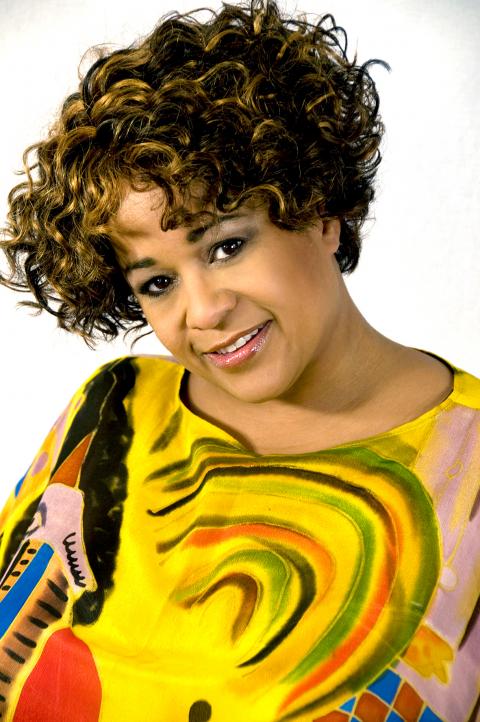When Cincinnati, Ohio-native Mandy Gaines belts out her tunes, listeners are immediately taken back to the time when sultry jazz songstresses and soulful R ’n’ B divas would knock their audiences’ socks off. Her two-month stint at Brown Sugar singing an eclectic mix of jazz, pop, R ’n’ B, soul, and reggae songs started at the beginning of last month. The Taipei Times caught up this sassy veteran of Taiwan’s music scene to talk about her upbringing, what it’s like to make a living out of music, and whether she is the real Brown Sugar.
Taipei Times: How did you start singing?
Mandy Gaines: I’ve been singing to records and putting on little shows for family and friends as long as I can remember. But once I was in school, I sang in choirs and plays and of course in church, too.

Photo courtesy of Mandy Gaines
TT: Who were some of your early influences?
MG: My early influences were Aretha Franklin, Ella Fitzgerald, Dinah Washington, and Barbra Streisand.
TT: When did you first realize that you wanted a career in singing?
MG: I knew I wanted to be a singer early on, too, because that’s all I ever was doing. Singing as a career goal became more formulated in school when I started studying music and being involved in theatrical productions.
TT: Have you found it easy or hard making a living out of music?
MG: It’s hard making a living as a musician. You have to really love what you are doing and be devoted to your craft. Sometimes you’re working and sometimes you’re not. It’s the name of the game. I have been very blessed to be able to keep my schedule fairly booked through most of the year.
(Gaines arrived in Taiwan in 1988, when she was invited by David Maurice, a close college friend, to be a part of a cross-cultural music project that was sponsored by a soft drink manufacturer. They formed the band MIT, which stood for Made in Taiwan, recorded with Rock Records and enjoyed a fair degree of success. She went on to start her own jazz groups during the three years she lived here full-time and recorded with Emil Chau (周華健) and Harlem Yu (庾澄慶), two of the country’s top pop artists.)
TT: You’ve been coming to Taiwan on and off for 24 years. What are some of the changes that you are most surprised about?
MG: I do love Taiwan, and the changes over the years have been great. The buildings are beautiful, the taxis are nicer and cleaner and there is much more thought in the city planning and expansion. There is an amazing choice in restaurants and also a grassroots cultural and arts explosion has been growing for at least the past 10 years.
TT: What is it about Taiwan that has kept you coming back?
MG: I keep coming back here because Taiwan has become my second home. I have many friends here and Brown Sugar is like a family to me.
TT: Is it true that Brown Sugar was named after you?
MG: I would like to believe they named Brown Sugar after me because I was told that by one of the original owners in 1998 when they opened.
TT: How long are you in Taiwan for?
MG: I’m in Taiwan through the end of May and I don’t know when I’ll be back, although it’s been once a year; so we’ll see!

The canonical shot of an East Asian city is a night skyline studded with towering apartment and office buildings, bright with neon and plastic signage, a landscape of energy and modernity. Another classic image is the same city seen from above, in which identical apartment towers march across the city, spilling out over nearby geography, like stylized soldiers colonizing new territory in a board game. Densely populated dynamic conurbations of money, technological innovation and convenience, it is hard to see the cities of East Asia as what they truly are: necropolises. Why is this? The East Asian development model, with

June 16 to June 22 The following flyer appeared on the streets of Hsinchu on June 12, 1895: “Taipei has already fallen to the Japanese barbarians, who have brought great misery to our land and people. We heard that the Japanese occupiers will tax our gardens, our houses, our bodies, and even our chickens, dogs, cows and pigs. They wear their hair wild, carve their teeth, tattoo their foreheads, wear strange clothes and speak a strange language. How can we be ruled by such people?” Posted by civilian militia leader Wu Tang-hsing (吳湯興), it was a call to arms to retake

This is a deeply unsettling period in Taiwan. Uncertainties are everywhere while everyone waits for a small army of other shoes to drop on nearly every front. During challenging times, interesting political changes can happen, yet all three major political parties are beset with scandals, strife and self-inflicted wounds. As the ruling party, the Democratic Progressive Party (DPP) is held accountable for not only the challenges to the party, but also the nation. Taiwan is geopolitically and economically under threat. Domestically, the administration is under siege by the opposition-controlled legislature and growing discontent with what opponents characterize as arrogant, autocratic

When Lisa, 20, laces into her ultra-high heels for her shift at a strip club in Ukraine’s Kharkiv, she knows that aside from dancing, she will have to comfort traumatized soldiers. Since Russia’s 2022 invasion, exhausted troops are the main clientele of the Flash Dancers club in the center of the northeastern city, just 20 kilometers from Russian forces. For some customers, it provides an “escape” from the war, said Valerya Zavatska — a 25-year-old law graduate who runs the club with her mother, an ex-dancer. But many are not there just for the show. They “want to talk about what hurts,” she